When you love someone deeply, you can sense their emotions without them saying a word. Have you ever looked at your child and immediately known something was wrong? Or noticed your spouse’s mood without a single conversation? Love allows us to feel what others are going through, even without being physically present.
Goda Devi’s love and devotion for the Lord were pure and unwavering. Her deepest desire was to unite with Him eternally. However, her devotion went beyond simply expressing this longing; it also offered a ‘solution’ to what ‘troubled’ the Lord.
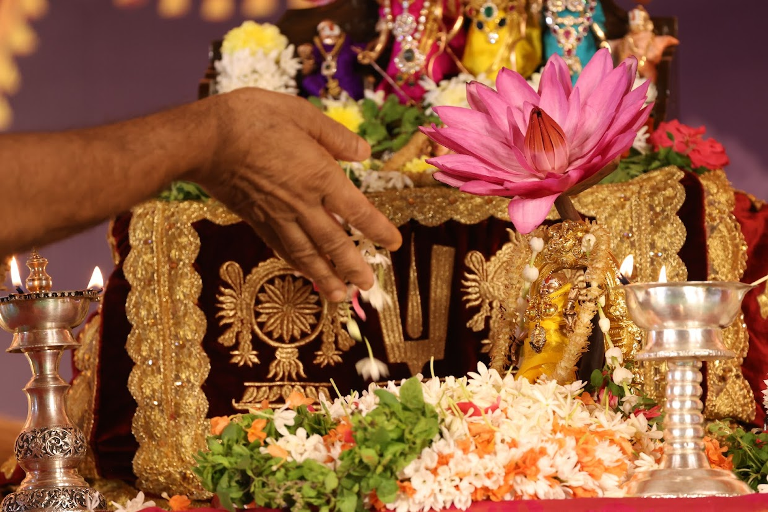
Wait a minute! How could God have something troubling Him?
The Lord’s ‘unfulfilled’ desire is that all beings be freed from the limitations and suffering of this world. He longs for us to experience the same eternal joy that He enjoys. Goda Devi’s boundless love for Him channeled this divine emotion into a form that guides seekers toward the bliss and liberation He desires for us.
We might ask, “What’s wrong with our current lives?” While suffering is a part of existence, does that mean we should not strive for a state free of suffering?
Is it even practical to aspire to such a state?

The answer is yes, it is practical. Each of us is meant to experience our true, natural state—one that shines through as ignorance and arrogance fade. This eternal state of being mirrors that of God’s.
He says in Bhagavad Githa
idam jna:nam upa:srithya
mama sa:dharmyam a:gatha:ha | BG 14.2
sa:dharmyam = similar state of Mine
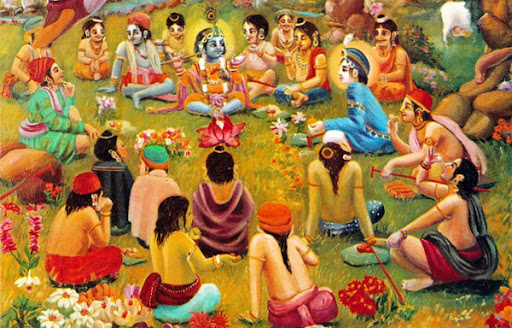
While not her intention, Goda Devi’s love for the Lord naturally resulted in an outpouring that became a seeker’s guide—relieving the Lord from His ‘pain’ of unfulfilled desire to free us from suffering.
Her approach to teaching us was different from the Lord’s more direct and strict method. With a compassionate, motherly nature, Goda Devi imparts each lesson playfully, almost as if she pioneered the concept of modern-day play schools. To bridge the gap between us and the Lord, she ‘demands’ that He simplify the path even further. And guess what? Such pure love conquered Him for her!
Her guidance was encapsulated in 30 verses, or songs, each offering a sequential step along the path to attaining the purpose of human birth. The 30 verses can be categorized into six groups, each containing five verses, based on their intent.
In the second group of five songs, which teach us the qualities to develop, Goda Devi emphasizes the importance of attentive listening and understanding, contemplating and revising the meaning and intent, and practicing these teachings until we reach perfection. This closely aligns with the guidance found in the Upanishads on the path to realizing God.
In the Brihadaranyaka Upanishad, Sage Yajnavalkya shares this wisdom with his wife Maitreyi:
sro:thavyaha manthavyaha nidhidhya:sithavyaha…
listen, contemplate, and practice until you clearly and consistently perceive what you have heard
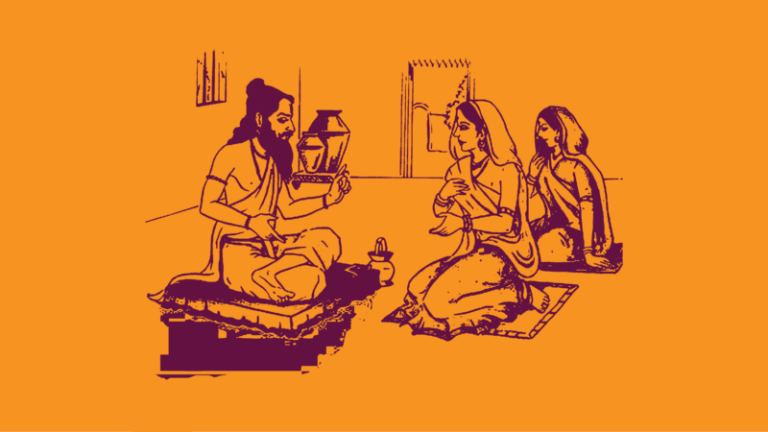
Let’s now go through the verses 6 through 10 of the Thiruppavai. It is highly recommended to chant these verses in their original language, as they were first composed. The reason for this is simple yet profound: the power and devotion embedded in the original words carry a unique energy. This sacred expression, shaped by the author’s deep devotion, resonates most powerfully when spoken in the language in which it was first conceived.
Listen (sro:thavyaha):
pullum silumbina ka:n!, pullaraiyin koyilil,
vellai vilisangin pe:raravam ke:ttilaiyo:,
pilla:y! yezhundira:y! pe:y mulai nanjundu,
kallachchagadam kalakkazhiya kka:lo:chchi,
vellaththaravil thuyil amaranda viththinai,
ullaththukkondu munivargalum yo:gigalum,
mella yezhundu ari yenra pe:r aravam,
ullam pugundu kulirinde:lo:r emba:va:y!
Thiruppavai – verse 6

In the above verse, Goda Devi playfully teases a gopika who remains fast asleep, despite hearing the three signs of early morning hours:
- The chirping of birds, symbolizing the words of the learned.
- The sound of the temple conch, representing the sound of Om.
- The chanting of Lord Hari’s name by the munis and yogis, embodying the essence of Om.
On a deeper level, Goda Devi is teaching us to wake up to the sounds of good words. Begin by listening to prayers and discourses from the acharyas whenever and wherever you can. Don’t think, “What’s the use of listening if I don’t understand the meaning?” Just as a baby listens to sounds and utters its first words without initially understanding their meaning, we don’t expect the baby to grasp the significance of words before learning to speak them. This is the essential first step.
For most of us, years have been spent learning about the external world—familiarizing ourselves with terms like owning a home, mortgages, new cars, and school admissions. Naturally, spiritual terms like atma, prakriti, paramatma, karma, moksha, muni, yogi, etc., may seem unfamiliar or difficult. But once you begin listening regularly, these words will start to feel more natural. And then, the next step will unfold…
ki:su ki:senru engum a:nai chcha:ththan, kalandu
pe:sina pe:chcharavam ke:ttilaiyo: pe:y ppenne: !
ka:sum pirappum kalagalappa kai pe:rthu,
va:sa narum kuzhal a:ychchiyar, maththina:l
o:sai ppaduththa thayir aravam ke:ttilaiyo:,
na:yaga ppenbilla:y! na:ra:yanan mu:rthi,
ke:savanai ppa:davum ni: ke:tte: kidaththiyo:
the:sam udaya:y! thira ve:lo:r emba:va:y!
Thiruppavai – verse 7
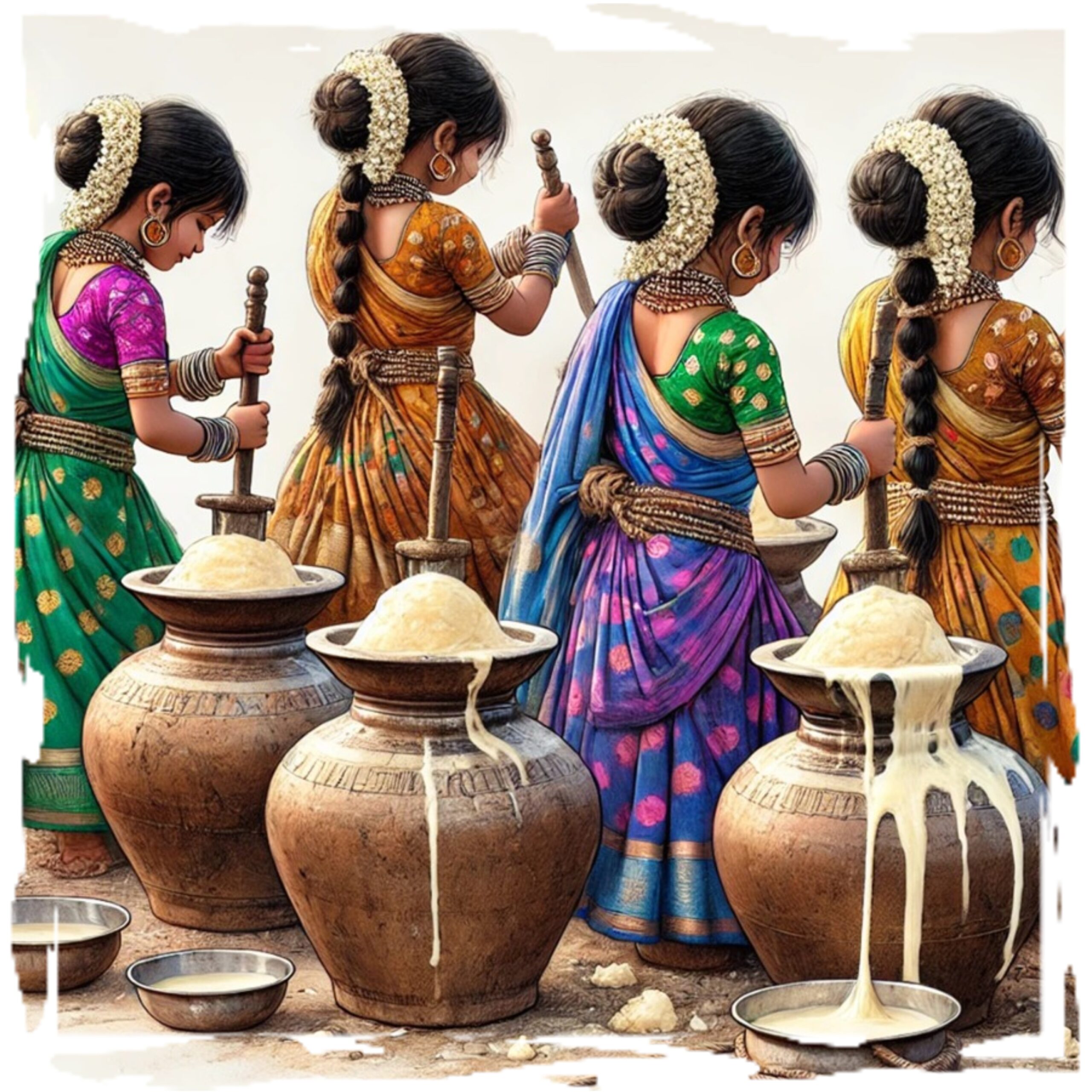
In the above verse, Goda Devi playfully teases the second gopika, who remains fast asleep despite hearing the second set of three signs of the early morning hours:
- The conversations among the birds, which they carry as memories to guide them through the day as they depart for their daily routine, symbolizing the importance of sharing your feelings about the Lord with fellow devotees.
- The churning sounds made by the gopikas as they prepare butter, illustrating how devotees view their nithya karma, daily activities—not as separate from, but as a form of service to the Lord, just as one would serve Him in a temple.
- The fragrance of flowers that fall from the gopikas’ hair, representing anushtana—the practice of those devotees whose behavior and actions inspire and motivate others.
On a deeper level, Goda Devi is teaching us to awaken not just to the sound of good words, but to the meaning behind them and the behaviors they should inspire. We must begin to live in accordance with the teachings we hear, allowing them to shape and guide our actions.
Did you catch the subtle reference to the sounds of birds in the two verses above by Goda Devi? Our revered Elders have always employed symbols to convey deeper, hidden meanings. Take, for instance, the symbolism behind certain words: Murthi represents the number 3, while Chakravarthi signifies the number 6. Similarly, birds are not just mentioned casually; they embody profound, inner truths that connect with the teachings of the Vedic tradition. Every sound, every image carries a deeper significance—inviting us to look beyond the surface and into the heart of wisdom.
What do birds symbolise?

Birds are a powerful symbol in spiritual teachings, representing the union of two essential qualities: jna:na (knowledge) and anushta:na (practice). With their two wings, birds soar high, signifying the balanced harmony between wisdom and action. They fly through a:ka:s—the sky— which in Sanskrit is made of two syllables a: + ka:s meaning “that which shines everywhere,” symbolizing God’s omnipresent form.
In this context, birds represent the peddalu, or the wise individuals, those who are equipped with both right knowledge and right practice. As Goda Devi awakens each gopika in the Thiruppavai, she’s not merely guiding them through a ritual. She is subtly teaching us about the qualities of such enlightened devotees—those who embody both wisdom and discipline. Through her teachings, she encourages us to recognize these qualities in others, seek their company, and, ultimately, strive to cultivate these virtues within ourselves.
Contemplate and reflect (manthavyaha):
ki:zh va:nam vellenru yerumai siru vi:du,
me:yva:n parandanaka:n! mikkulla pillaigalum,
po:va:n po:ginra:rai po:ga:mal ka:ththu, unnai
ku:vuva:n vandu ninro:m, ko:dukalam udaya
pa:va:y! ezhundira:y! pa:di parai kondu,
ma:va:y pilanda:nai mallarai ma:ttiya,
de:va:di de:vanai chchenru na:m se:viththa:l,
a:va:venru a:ra:indu arul e:lo:r
Thiruppavai – verse 8

In the above verse, Goda Devi playfully teases the third gopika, who remains fast asleep despite the third set of signs of the early morning hours:
- The white, rising sunlight on the eastern horizon, symbolizing the radiant faces of those longing for the blessings and company of Krishna’s beloved devotees.
- The buffaloes are let out to graze on tender grass to break their fast, only to see that they return. They must then be released again for a larger meal. This illustrates how the wise live in the world. They partake only of the sattva (milk) and avoid the thamas (buffaloes). This cycle repeats every day, symbolizing the constant need for the wise to reflect on the teachings of the scriptures and engage with fellow seekers. The world continuously piles up tendencies, and so ongoing reflection is necessary to keep them in check.
- The utterance of the Lord’s names—Narayana, Murthi, and Kesava—represents the omnipresence of the Supreme Divine, the accessible manifestation of the Divine through deities or avatars, and the destroyer of ahamkara (ego, which arises from the ignorance of our true nature as distinct from the body and from the Supreme Reality), all with the purpose of uplifting us.
Goda Devi is teaching us the importance of constant reflection and meditation on the teachings. Our nature, influenced by prakriti, and colored by past tendencies—is inherently dominated by thamas, which signals the need for ongoing revision and reinforcement of what we learn.
Perfection (nidhidhya:sithavyaha):
thu:mani ma:daththu suththum vilakkeriya,
thu:pam kamazha thuyil anaime:l kan valarum,
ma:ma:n magale! manikkadavam tha:l thirava:y!,
ma:mi:r!avalai yezhuppi:ro:, unmagalda:n
u:maiyo: ? anrich chevido:, anandalo: ?,
e:map perum thuyil mandirappatta:lo: ?,
ma:ma:yan ma:davan vaigundan enrenru,
na:mam palavum navinre:lo:r emba:va:y !
Thiruppavai – verse 9

In the above song, Goda Devi playfully teases the fourth gopika, accusing her of being “asleep” to the needs of others because she is blissfully absorbed in the company of Krishna, forgetting her role as a leader for all of us. Goda Devi “complains” that the gopika is:
- Fully content in a visuddha abode – pure, gem-studded, rich house, symbolizing that she is dwelling in the heart of the Lord and forgetting to lead those seeking guidance.
- Inactive, blind, deaf, and dumb, meaning she is oblivious to anything that doesn’t align with her ultimate goal, remaining unaffected by distractions.
In a deeper sense, Goda Devi is teaching us the meanings of visuddha and nirmala in this context. Visuddha refers to the pure heart of the Lord, untouched by impurities, in which the devotee resides. In contrast, nirmala represents the devotee’s heart, which has been tainted but has been cleansed.
She also speaks of the qualities of the gopika who is unwavering in her goal—nischala and achala. These terms describe a firmness where nothing can shake your resolve, much like water in a frozen glass that never spills, no matter what. Goda Devi teaches us that such devotees have no heart for anything other than Krishna. This is the final stage of sthitha prajnatha, the state of a fully focused mind. Examples of this stage can be found in the lives of Suka Maharshi and Viswamitra (in his final stage).
no:ththu chchuvargam puguginra ammana:y,
ma:ththamum tha:ra:ro: va:sal thirava:da:r,
na:ththa ththuzha:y mudi na:ra:yanan, namma:l
po:ththa pparai tharum punniyana:l, pandoru na:l
ku:ththaththin va:y vi:zhnda kumbakarananum,
tho:ththum unakke: perum thuyil tha:n thanda:no:,
a:ththa vanandal udaiya:y! arungalame: !,
the:ththama:y vandu thirave:lo:r emba:va:y!
Thiruppavai – 10
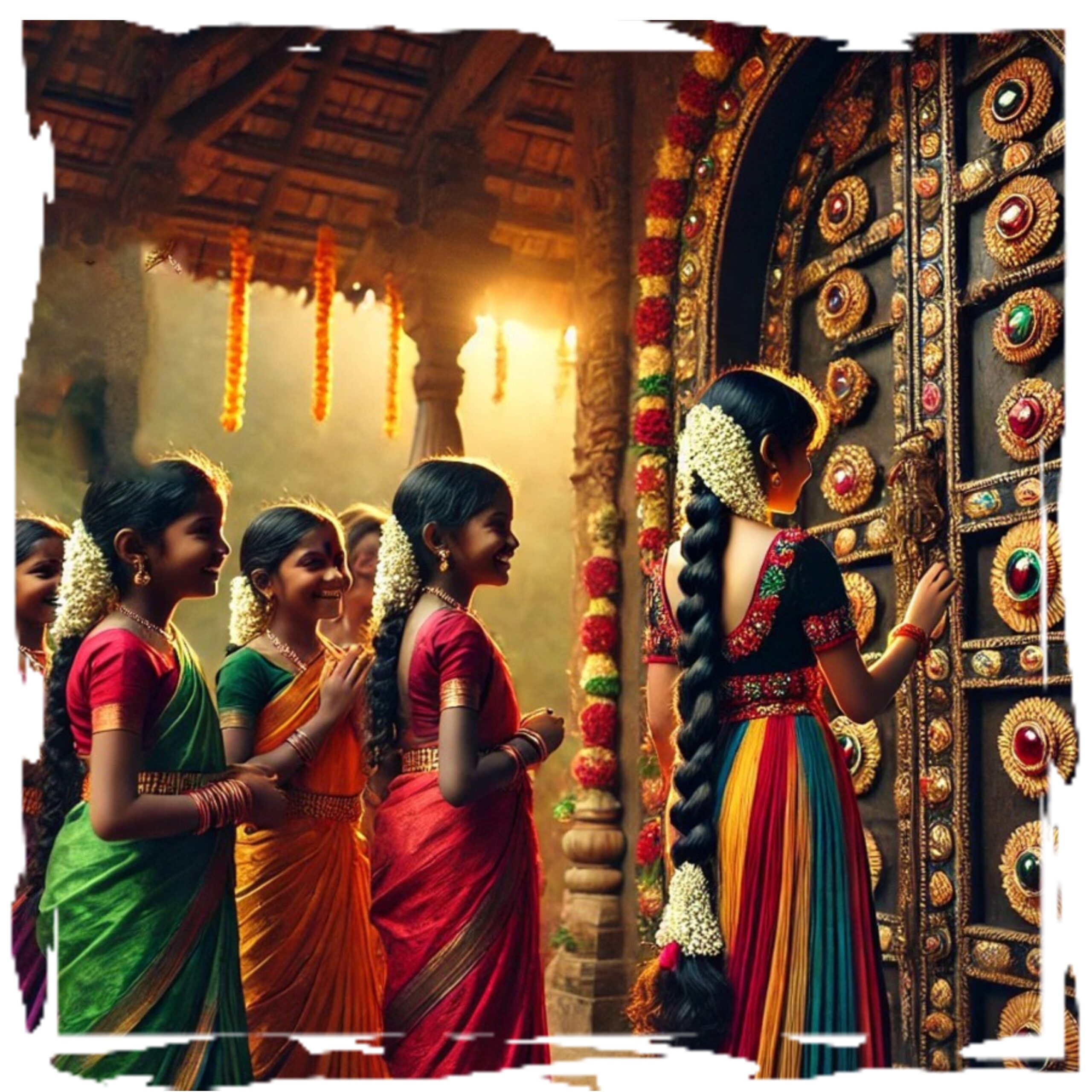
In the above verse, Goda Devi playfully teases the fifth gopika, suggesting that she must have won a bet with Kumbhakarna and received his sleep as the prize. She teases her for:
- Being happy because He desired her, implying that she understands there is nothing she needs to do to attain His grace. It is His grace alone that has brought her into His presence.
- Not bothering to comfort us, indicating that she should be attentive to those who reach out to her and not ignore them.
- The fragrance of sree thulasi, symbolizing Krishna’s presence, showing that her heart is filled with joy, and that joy reflects outwardly.
- Being ‘selfish’, not sharing Krishna with others, implying that Krishna is for everyone, regardless of any differences.
On a deeper level, Goda Devi teaches us that a true devotee does not seek God for anything because God gives Himself to those who seek nothing in return. Moreover, there is nothing we must do to earn His grace—so long as we do not hinder it by our own attempts. For the true devotee, both the means and the end are the same: God, much like a mother who is both the means and the result for a crying baby.
One can only attain God through those who truly know Him. We must seek the guidance and company of the five types of devotees who embody the qualities of true devotion. Additionally, there are another five types of devotees who reflect how to perform our karma, cultivate knowledge, and conduct ourselves with integrity, forbearance and humility. In her teachings, Goda Devi introduces us to a total of ten types of devotees whom we should approach and learn from. By seeking their blessings and aligning ourselves with them, we can engage in the snana vratham—the sacred penance of immersing ourselves in the divine qualities of Lord Krishna.
Although the journey is not easy, it is only through the Lord’s grace that it becomes possible. We cannot fully understand how He accomplishes this. Just as the people of Nandavraja were unaware of how He defeated the asuras sent by Kamsa from Mathura, the Lord eliminates the asura-like obstacles in our lives, such as the consequences of past karma (represented by Sakatasura) and the influences of nature (symbolized by Putana).
-From the discourse of HH Chinna Jeeyar Swamiji
– Day 6 to Day 10 of Dhanurmasam 2024
– 18th Dec 2024 to 22nd Dec 2024
– Mangalagiri
- Reflect and Share: Have you come across any “gopikas” in your own life? If so, feel free to share your thoughts in the comments below. Remember, the term gopika is not limited to a specific gender—it refers to anyone embodying the qualities described in each of the verses of the Thiruppavai. Let’s connect and engage with one another on this platform..

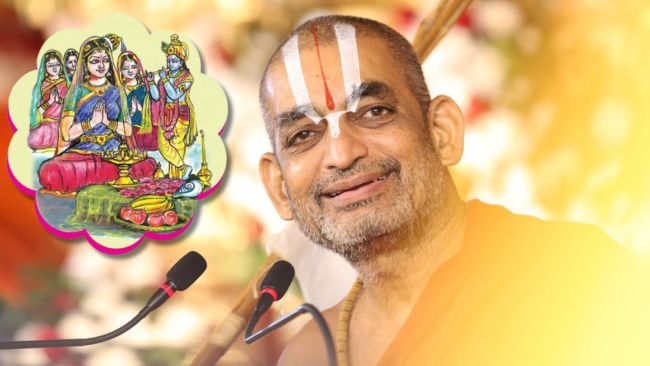
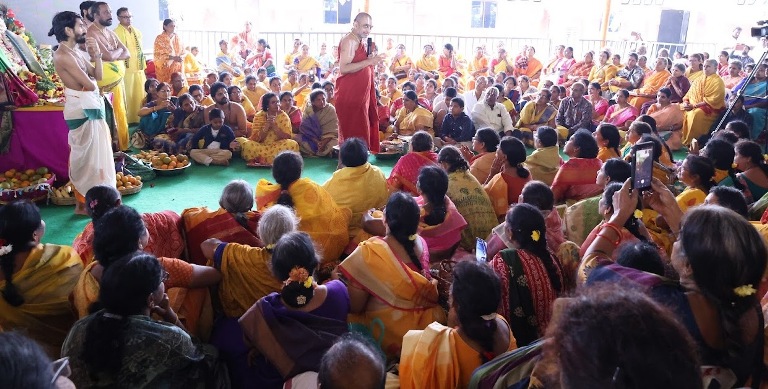

Pranam to swamiji. His Holiness has explained vedantic meditation linking with Brihadarnyaka upanishad for gaining Bramha Ghana.
జై శ్రీమన్నారాయణ
🙏🏻🙇♀️